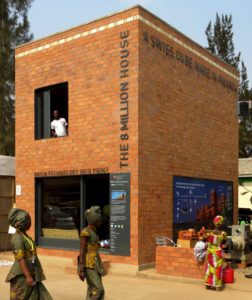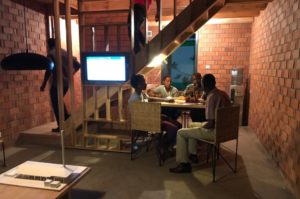The PROECCO Programme
Promoting Climate Responsive Building Material Production and Off-farm Employment in the Great Lakes Region
The current technologies for energy efficient building material production in the Great Lakes Region are economically not viable for mass scale dissemination. During Phase I of the project successful technologies and production methods from Africa, Asia or Latin America have been transferred to the Region. During Phase II, the economic and social performance of the set of solutions, will be monitored optimised and validated in detail under real life conditions. The private sector will be supported in the establishing of competitive local brick making clusters with complete value chains and a performance based incentive system for certified producers of Modern Bricks. At the same time, authorities and private brick makers are supported in accessing most relevant data, literature and expertise. Through industry facilitation services local authority officers will be capacitated to implement new policies in a most effective manner.
Project Facts
Country:
Great Lakes Region (Rwanda, Burundi, South Kivu/DRC)
Project Period:
2012 –2024
Team
Project Director: Florian Klingel
Project Manager: Daniel Wyss
Expats: Enrico Morriello, Franck Ahonoga, Marco Ziliotto
Backstopping: DWY, Silas Markert, Max Müller
Website developed by PROECCO
Project Description
Context
Rwanda and Burundi are Africa’s most densely inhabited countries. Their population doubles every 25-30 years and the cultivation land per farmer family shrank far below the FAO minimum for a sustainable agricultural livelihood. To address the fast growing housing and building material needs and compensate their decreasing agrarian income, farmers seasonally mine and mould millions of cubic metres of clay and sand and burn hundreds of thousands of tons of fuelwood in brick kilns each year, further destroying arable land and with it the livelihoods of future generations.
The programme’s main objectives
Objective: The impact of building material production on environment and climate in the Great Lakes Region is minimised, and at the same time the livelihoods and working conditions of tile and brickyard workers are improved.
The Programme promoting off-farm employment and income in the Great Lakes region through climate responsive construction material production supports the creation of permanent non-agrarian jobs in rural block- and brickyards. The people targeted for this are the rural young, who are currently labouring seasonally in farm-side brickyards and innovative entrepreneurs willing to pioneer permanently operated building material production yards.
- Building material manufacturing methods and technologies
Successful technologies and production methods from Africa, Asia or Latin America shall be transferred to the Great Lakes Region and adapted to local raw materials, fuels and market context, in cooperation with vocational training centres and the private sector.
- Skills trainings
Trainings modules for labour, production managers and service providers shall be developed, and trainers of trainers trained.
- Support in Land Use Planning and Natural Resource Use Management
For identifying suitable building material production zones, local authorities are supported in establishing detailed inventories of clays, fuels and markets and in the mapping of other information which is relevant for the sector.
Activities
Monitor and validate the economic and social performance of developed solutions. Establish an inventory on raw material, resoucre use management, action research, trainings, develop manuals, develop role models, provide business information to investors and banks to facilitate access to credits.
Geographic scope
During the initial phase, the programme focuses its activities on the Burundian Province Ngozi and on five Districts in the Western Province of Rwanda, where field offices are being established. The back office in Kigali plays the role of a Knowledge HUB, channelling regional and international know-how and information to all relevant stakeholders.
Partners
Technical, socio-economical, environmental and institutional expertise is provided on demand by Skat and SDC’s local, regional and international network. Strategic coaching is provided by selected institutions from the North and the South, such as CRAterre (FRA), Greentech Solutions (IND), VSBK HUB Southern Africa (RSA), and the Federal Office of Topography (SUI).
Story of the project: Strengthening capacity
Callixte Ntabose and Alfred Mazimpaka
Masons are trained during the construction of Mpazi 8-in-1 affordable urban housing demonstration block, Rwanda
Both Callixte and Alfred completed the mason training during the construction of PROECCO’s 8-in-1 affordable housing construction. Since then, their chances to be employed as masons, using the learned and practiced RLB system have increased and their lives have changed for better.
Callixte is making enough savings to cover his family’s needs and his wife has started running a fruit and vegetable business at the local market. Alfred saved enough to contribute to the construction of his family house in the countryside. Alfred is grateful for the opportunity to learn new construction techniques and gain more experiences under a technical guidance and coaching. They are honor to see the house that they constructed.
Main Results
Investors and authorities along the value chain take informed decisions based on relevant key-information and expertise for transforming the sector into an inclusive industry for affordable building material supply. Local supply chains for Modern Bricks made in Rwanda, Burundi and the Bukavu Zone are established and prepared to scale and the demand for Modern Brick enables the sector to scale up





